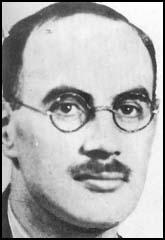Allan Nunn May

Allan Nunn May, the son of a brassfounder, was born in Kings Norton, Birmingham, on 2nd May 1911. An extremely intelligent student he won a scholarship to Trinity Hall, Cambridge in 1930. He obtained a first in physics and then studied for a PhD under Ernest Rutherford. On its completion he given a lectureship at King's College, London.
Nunn May developed left-wing political opinions and as well as joining the Communist Party he was active in the Association of Scientific Workers.
In 1939 he began work on a secret radar project at Suffolk. He then moved to Bristol where he worked with Cecil Powell on a project that attempted to detect fast particles from radioactive substances using photographic methods.
During the Second World War May Nunn was recruited by James Chadwick to the team at Cambridge University working on the possible use of heavy water as the basis for a reactor.
In 1942 the Manhattan Engineer Project was set up in the United States under the command of Brigadier General Leslie Groves. Scientists recruited to produce an atom bomb included Robert Oppenheimer (USA), David Bohm (USA), Leo Szilard (Hungary), Eugene Wigner (Hungary), Rudolf Peierls (Germany), Otto Frisch (Germany), Niels Bohr (Denmark), Felix Bloch (Switzerland), James Franck (Germany), Emilio Segre (Italy), Enrico Fermi (Italy), Klaus Fuchs (Germany) and Edward Teller (Hungary).
Nunn May and James Chadwick also joined the project. Nunn May was based with the Tube Alloys research team developing the atom bomb at chalk River near Montreal, Canada. Although he was no longer a member of the Communist Party he believed that the information about how to develop this weapon should be shared with Britain's ally in the war, the Soviet Union. He did this by secretly supplying samples of uranium 233 and 235 to his Russian contact.
On 5th September 1945, Igor Gouzenko, a KGB intelligence officer based in Canada, defected to the West claiming he had evidence of British spies. Some of this information from Gouzenko resulted in May Nunn and Klaus Fuchs being interviewed by MI5. Eventually he confessed to spying and on 1st May 1946 he was sentenced to 10 years hard labour. When Nunn May was released in 1952 he stated he only passed on information because he felt it was a "contribution I could make to the safety of mankind."
After leaving prison Nunn May was blacklisted in Britain and so in 1961 he went to work in Ghana. While there he carried out research into solid state physics and created a science museum in the country.
Allan Nunn May died in Cambridge on 12th January 2003.
Primary Sources
(1) Primo Levi, Survival in Auschwitz (1947)
Last spring the Germans had constructed huge tents in an open space in the Lager. For the whole of the good season each of them had catered for over 1,000 men: now the tents had been taken down, and an excess 2,000 guests crowded our huts. We old prisoners knew that the Germans did not like these irregularities and that something would soon happen to reduce our number.
